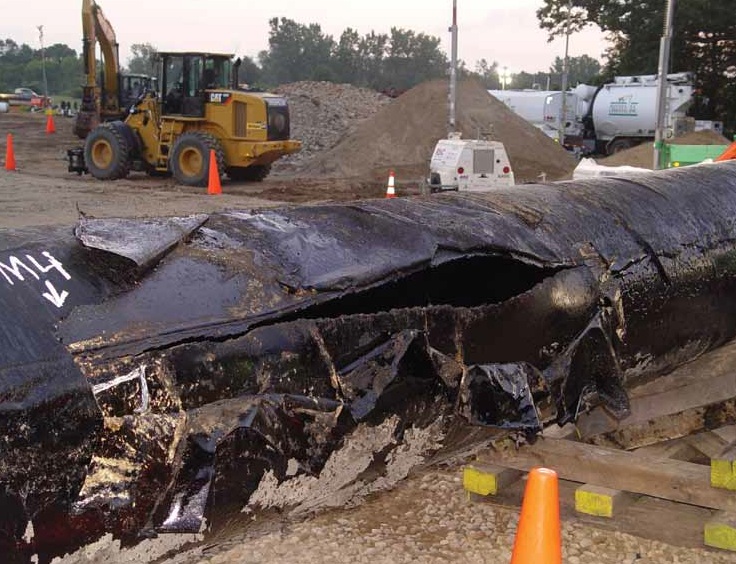Concerned Landowners and Groups Seek Clarity that Vermont Can Protect Its Environment From Tar Sands Pipeline With Exxon Tar Sands Project Imminent, Decision on Act 250 Jurisdiction Sought
MONTPELIER, VT — Six Northeast Kingdom residents and landowners joined conservation groups in filing a request with the Act 250 District Coordinator in St. Johnsbury seeking affirmation that Exxon cannot use an existing 63 year-old pipeline to ship corrosive tar sands oil through Vermont without Act 250 state land use approval. The filing seeks a jurisdiction opinion that reversing the flow of the Portland-Montreal Pipe Line and using it to transport tar sands – a tarry, viscous, substance mined in Alberta – would be a “substantial change in use” requiring a state land use (Act 250) permit. Unrefined tar sands is different than conventional crude oil and poses major environmental and economic risks: it is extremely carbon intensive, must be transported at high pressures and temperatures which threaten pipeline integrity, and is more difficult and expensive to clean up when it does spill.
The filing arises from the piecemeal revival of a 2008 plan by oil giants Enbridge and Exxon to reverse the flow of the pipeline for tar sands use. While denying the 2008 plan is being revived, Enbridge has a pending application in Canada to ship oil, including the option to ship heavy tar sands, to Montreal and has expressed intent to move tar sands “beyond” Montreal. The only viable option for going “beyond” Montreal is to ship it through Vermont to Portland, Maine, where it would likely be exported. If the Canadian government approves the reversal, the Portland-Montreal Pipe Line reversal is the last major piece needed in these companies’ endeavors to transport tar sands to Portland, Maine. It is crucial to achieve clarity now that Vermont law provides protection for potentially affected land and resources.
“The project would directly impact my farm,” said Barton resident, Reed Olson, co-owner of Four Acre Farm. “The pipeline cuts right through prime farmland I rely on for my livelihood. Not only would tar sands sully my business, but as a farmer I depend on a predictable climate and tar sands is one of the worst climate change offenders there is.”
Enbridge and Exxon subsidiary Portland Pipe Line Corporation, which operated the Vermont pipeline, have previously denied they are seeking to bring tar sands east but the evidence is mounting that the companies wish to bring tar sands through Ontario, Quebec, and then to Vermont and New England. For instance, in a December application before the Canadian National Energy Board, Enbridge made clear it intended to carry “heavy crude” to Montreal and made requests suggesting it intends to transport tar sands in its rawest form.
Exxon officials have also met with towns along the pipeline route to try and allay concerns about tar sands, met with Maine’s governor about tar sands development, and participated in a region wide training on how to respond to a tar sands spill. “The Northeast Kingdom is Vermont’s wildest and most beautiful place,” said Ron Holland of Irasburg, Vermont. “It is no place to bring the world’s dirtiest oil. Vermonters need to be able to protect their land and resources from the impacts of dirty fossil fuels, including climate change impacts.”
Due to the high energy costs of extraction and production, tar sands is significantly more carbon intensive than conventional forms of crude. When tar sands does spill, it causes more damage to land, wildlife and environmental health, and is nearly impossible to clean-up even at enormous expense. The 2010 spill in Michigan’s Kalamazoo River is still being cleaned today and, at nearly a billion dollars and counting, stands as the most expensive inland pipeline spill in history. (See http://blog.nwf.org/wp-content/blogs.dir/11/files/2012/07/NWF_EnbridgeOilSpill_Final.pdf for more information on this and other oil spills).
“Vermont is committed to a clean energy future,” said Jim Murphy, Senior Counsel at National Wildlife Federation. “Tar sands development would send us past every climate tipping point scientists have warned of. Vermont needs a chance to say no to tar sands development, and yes to a clean energy future that will preserve the Vermont we love for future generations.”
“Climate change is the biggest environmental challenge of this generation,” said Sandra Levine, Senior Attorney at Conservation Law Foundation. “Tar sands oil, with its high greenhouse gas emissions, has no place in Vermont, which is taking careful steps to reduce emissions.”
“Citizens across Vermont are being mobilized by the tar sands issue. As of today, volunteer organizers in 23 towns, from Burlington to Walden to Greensboro, have placed resolutions against tar sands transport on their Town Meeting agenda,” said Andy Simon of 350 Vermont. “The same is happening throughout New England. It’s direct democracy in its most vibrant form.”
“Allowing the transport of the world’s dirtiest fuel across Vermont’s most pristine landscape is all risk and no benefit to Vermonters,” said Vermont Natural Resources Council’s Energy Program Director Johanna Miller. “It’s refreshing that legislative leaders and Governor Shumlin clearly recognize this, and it’s our hope that they use any tool they can to proactively stop this effort.”
In 2008, Exxon lawyers sought a determination as to whether the project would need Act 250 approval, but that process was never finalized. “This Act 250 Request seeks to insure that Vermont, and Vermonters, will have a say in deciding the impacts of tar sands on their future,” said Doug Ruley, Director of the Environmental and Natural Resources Clinic at Vermont Law School. “Significant state resources such as the Willoughby State Forest are at risk, as are private lands and Vermont’s future climate.”
The filers of the jurisdictional opinion request include: Brent and Rona Kinsley of Irasburg, Vermont, Ron Holland and Laurie Green of Irasburg, Vermont, Reed Olsen and Adam Favalaro of Newport, Vermont, who jointly operate a business in Barton, Vermont, Conservation Law Foundation, National Wildlife Federation, Natural Resources Defense Council, 350.org, 350 Vermont, Sierra Club-Vermont, Vermont Natural Resources Council, and Vermont Public Interest Research Group.
###

